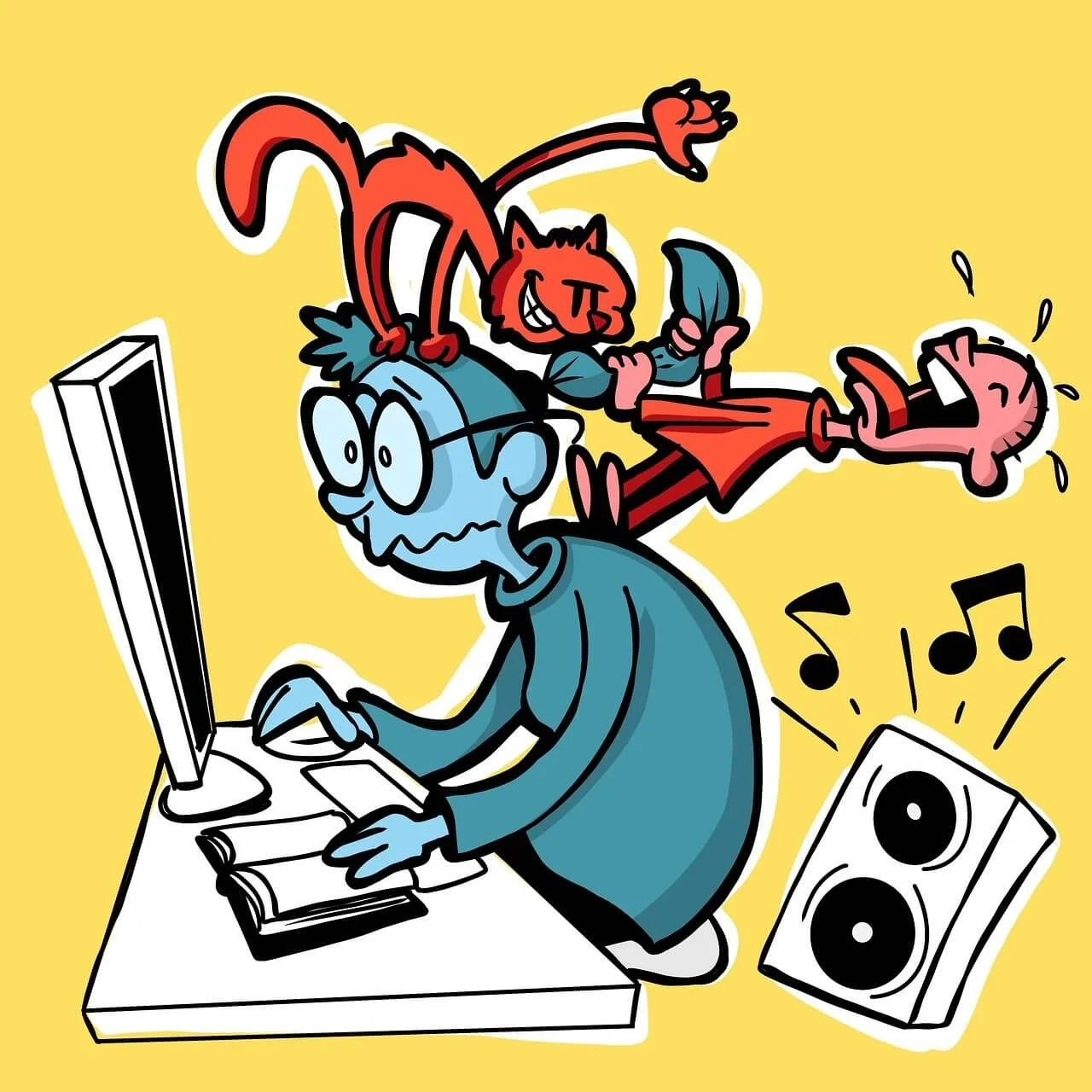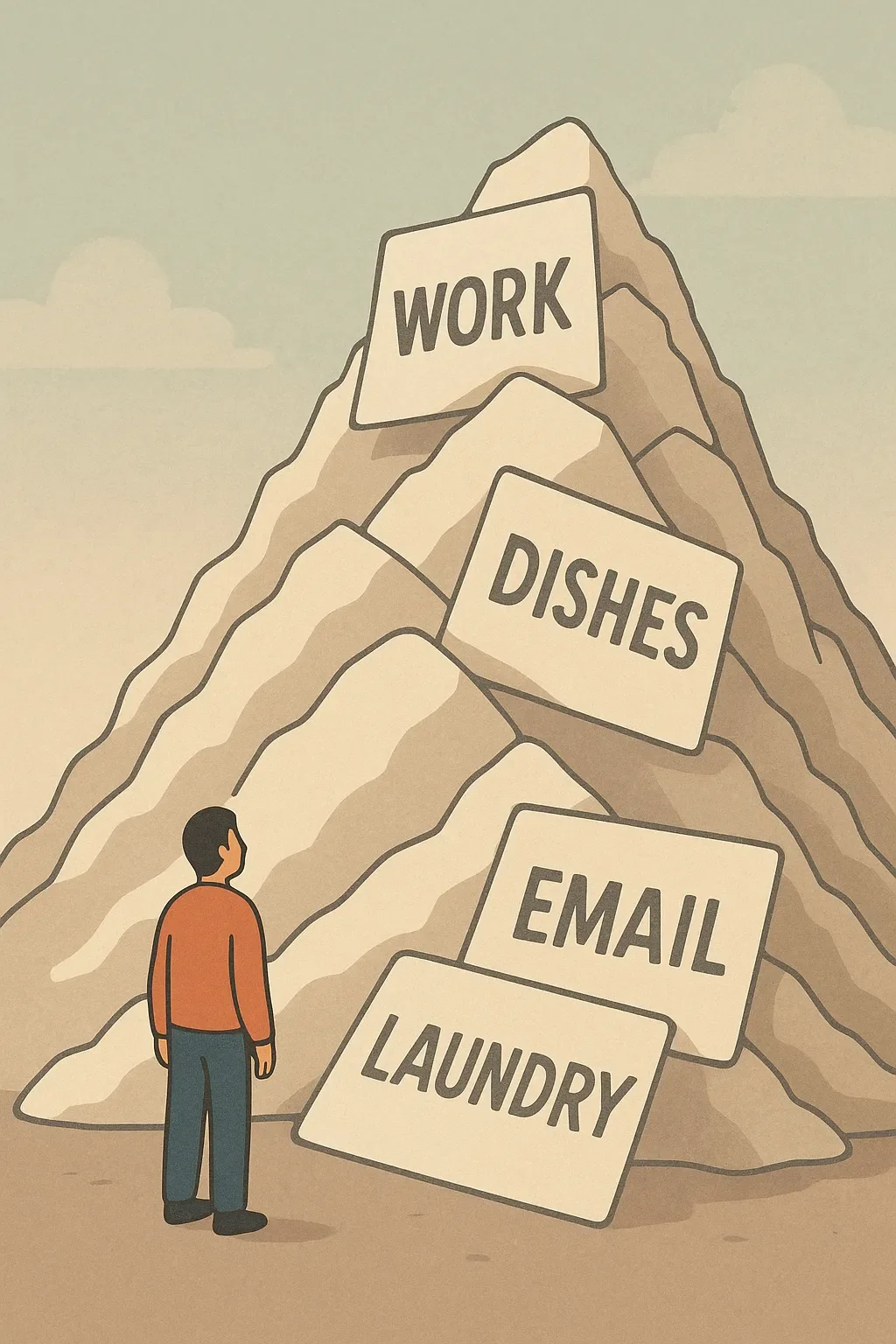ADHD, Motivation, and Task Paralysis
If you struggle to start tasks even when you genuinely want to, you’re not alone. What many people refer to as task paralysis is a common and often confusing experience for those living with ADHD-related patterns. It doesn’t just shape productivity — it can also influence confidence, day-to-day stress, and how connected you feel to others.
This guide explores:
what task paralysis often looks like
common factors that make completing tasks harder
how the cycle can build over time
tools people find useful to overcome ADHD paralysis
For a broader overview of how I provide ADHD counseling in Gainesville and across Florida, start here: Adult ADHD Therapy →
What Task Paralysis Feels Like With ADHD
Mental paralysis isn’t simply “putting something off.” For many people, it feels like a freeze response — a moment when you want to act, but can’t get yourself to start.
People often describe it as:
“I know what to do, but I can’t seem to begin. It feels like my body won’t move, even when I want it to.”
From the outside, it looks simple — send the email, start the laundry, open the document.
On the inside, it can feel like:
pressure
confusion
overwhelm
emotional weight
fear of getting it wrong
For many people, it’s not about laziness. It’s more like getting stuck under stress or internal pressure. Many people notice task paralysis during moments of stress, uncertainty, or emotional intensity.
Why Starting Tasks Can Feel So Hard with ADHD
For many people with ADHD, starting a task isn’t one moment. It’s a series of steps — getting motivated, choosing a starting point, settling emotions, and remembering what to do next. When any part of that sequence feels shaky, everything can stall.
Below are a few common experiences people describe.
Motivation doesn’t always “turn on” right away
You might care about the task — and still have difficulty with time management.
The first step isn’t obvious
A task like “send the email” becomes: find the wording, decide the tone, locate the information, and figure out when to send it. When the starting point isn’t clear, ADHD patterns can make the whole thing feel too big.
Working memory slips in at the worst moments
Many people explain it this way: “I know what to do… but the plan disappears the moment I try to start.”
This creates the “I’m ready, but something isn’t clicking” feeling.
Emotions can crowd out action
Overwhelm, frustration, or fear of getting it wrong can take up so much mental space that the task feels impossible to approach — even if it’s small.
Together, these experiences can make task initiation feel heavier than people expect.
Emotional intensity amplifies hesitation
Many people with ADHD describe experiencing emotions more intensely.
Common experiences:
• fear of messing up
• fear of wasting time
• fear of choosing the wrong task
• fear of being judged
These fears can feel huge, even when the task is small.
Mental energy fluctuates throughout the day
ADHD experiences can vary day to day.
Some days you may feel unstoppable.
Other days your brain feels like it’s moving through mud.
How This Shows Up When You Try to Start a Task
• Difficulty breaking a task into steps
• Freeze response when emotions rise
• Overthinking instead of doing
• Shifting into avoidance automatically
This is a common ADHD-related pattern — not a personality flaw.
The Avoidance and Shame Cycle
Task paralysis can turn into a painful loop
Task feels big → you freeze → you avoid → anxiety rises → shame shows up → you feel “behind” → the task feels even bigger next time.
This cycle can feel emotionally heavy.
Many people with ADHD-related challenges describe thoughts like:
“I feel broken.”
“Why is this so hard for me?”
A gentler way to understand this
For many people, the avoidance isn’t about the task itself. It’s about the overwhelming feelings that show up the moment they try to start.
Some describe it as a freeze-like response — a moment where everything inside feels too fast, too intense, or too pressured, even if the task is small.
This is a common pattern for people navigating ADHD and overwhelm. You’re not alone in it.
ADHD-Friendly Ways to Break Through Task Paralysis
These ideas are meant to be small starting points, not a checklist you have to complete. If you’re feeling stuck, choose just one gentle step and see what happens. If any suggestion makes you feel worse, skip it and return to what feels steady.
Choose a micro-step
Instead of “clean the kitchen,” pick one microscopic action:
Put one cup in the sink.
Turn on the light.
Open the trash bag.
For many people, momentum can build from the smallest possible step.
The two-minute rule
Commit to working for just two minutes and stop if you want to.
Many people notice that once they begin, continuing can feel a little easier — but stopping after two minutes is always an option.
Stand near the task (proximity activation)
Physically move to the space where the task is.
Many people notice it feels easier to start when they’re closer to the cue.
Reduce friction
ADHD brains can be sensitive to small barriers.
Lowering the barrier may make starting easier.
Examples:
• set clothes out the night before
• pre-pack bags
• leave your laptop open
• put items you need in plain sight
Create a “starting ritual”
A predictable routine may act as a signal to switch into work mode.
Example:
• drink water
• set a 2-minute timer
• put your phone in another room
• take a deep breath
• begin micro-step
This can act as a bridge into action
How Technology Makes ADHD Motivation Even Harder
Our digital world is designed to keep your attention
Short-form content, notifications, fast feedback — these all create quick bursts of stimulation. For many people with ADHD, that pull can feel even stronger, making longer or slower tasks harder to approach.
Many people describe experiences like:
“I meant to start… but I ended up scrolling for 30 minutes.”
“I lose time online before I even realize what happened.”
This isn’t a discipline problem. Many people are navigating a mix of ADHD-related patterns, overstimulation, and the constant pull of fast digital content.
Understanding this pattern can reduce shame and open space to explore different strategies.
How ADHD Therapy Supports Motivation and Momentum
ADHD counseling isn’t about trying harder — it’s about exploring tools and approaches that fit how you naturally operate.
Therapy often includes working on:
• understanding overwhelm and internal pressure
• noticing emotional triggers that contribute to freezing
• experimenting with ADHD-friendly routines
• exploring strategies for getting started
• reducing shame and self-blame around productivity
This may include structured approaches such as CBT-informed strategies, DBT-based skills for emotional intensity, behavioral activation, and executive functioning supports.
Therapy offers a consistent space to explore what feels manageable, build insight, and experiment with tools that fit your real life.
FAQ for ADHD Task Paralysis
Why do tasks that seem “simple” feel impossible?
Many people with ADHD describe a freeze-like feeling when a task is overwhelming, unclear, or emotionally charged. Starting involves multiple steps, and when several feel strained, everything can stall.
Is task paralysis part of ADHD or something else?
It’s common in ADHD, but also appears with anxiety, perfectionism, burnout, or stress. Therapy can help explore what contributes to it for you.
Why can I do some tasks easily but not others?
Tasks often feel easier when they’re interesting or structured, and harder when they’re boring, vague, or emotionally heavy. This inconsistency is a common ADHD-related pattern, not a personal flaw.
Procrastination or task paralysis — what’s the difference?
Procrastination is choosing to delay.
Task paralysis is wanting to start but feeling stuck, often with overwhelm or internal pressure.
Why do I feel so guilty about not starting?
Many adults with ADHD carry old messages like “lazy” or “not trying hard enough,” which creates shame. Understanding the pattern can make the guilt feel less personal.
How can therapy help?
Therapy often explores what fuels the freeze, ADHD-friendly ways to get started, routines that reduce overwhelm, and tools that ease self-blame — all at a pace that fits your needs.
Do I need an ADHD diagnosis?
No. You can work on motivation, overwhelm, emotional intensity, and daily structure with or without a formal diagnosis.
What if I feel too behind to start therapy?
Many people begin therapy feeling overwhelmed or stuck. You don’t need to be organized or “ready” — therapy meets you where you are.
Further Reading
Prefer to learn more before deciding? Here are a few helpful reads:
Adult ADHD Therapy →
An overview of ADHD counseling in Gainesville and across Florida.ADHD and Technology →
How screens can amplify avoidance and overwhelm, plus gentle ways to work with it.




